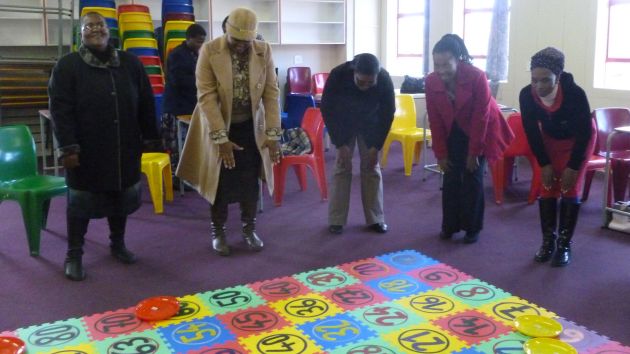7 x 7 = 49. 5 x 8 = 40. 4 x 7 = 28 … It might sound like simple memorizing of the times tables, but in fact this is “learning through movement.” Together with the Walter Sisulu University and the Department of Education of South Africa’s Eastern Cape Province, Siemens Stiftung initiated a workshop for the start of the new term at the province’s “Mandela School of Science and Technology.” Twenty-five teachers and educational professionals from nearby elementary schools learned a simple but effective method of teaching mathematics. Prompted by the ideas and suggestions of the workshop leader, they hopped, skipped and jumped their way through a giant 3 x 3 meter board game laid out on the ground, which depicts the numbers from one to 100: the times table in physical form.
By enabling pupils to literally “walk through the solutions,” the game offers a playful way of learning the four types of basic arithmetic – addition, subtraction, multiplication and division – and helps participants to gain a better understanding of numbers. It not only helps them get to grips with mathematics, but also allows them to practice engaging all their faculties as part of the thought process. Participants use touch, vision and other senses as well as motor skills to solve the tasks. At the same time, the game promotes players’ ability to cooperate and communicate as almost all the exercises are performed in teams, with the children finding solutions together. To complement the floor game, all the schools participating in the workshop were given a smaller board game version designed for the classroom.
Based on the international educational program Experimento, which uses an activity-based approach of learning through experience, the game provides educational professionals with a teaching and learning method that can make basic mathematics more accessible to their students and fill in significant gaps in knowledge. As in many parts of the world, basic arithmetic and the times table from one to 10 are a big headache for the elementary school pupils.
“We see many children who have problems with simple arithmetic and understanding the difference between numbers like 29 and 92. But basic arithmetic is fundamental knowledge and an important prerequisite if children are to understand scientific and technical processes. Because the foundations for acquiring knowledge are laid in elementary school, we want to give educators there practical assistance using these playful methods of teaching and learning,” says Rebecca Ottmann, who is responsible for the African countries in Siemens Stiftung’s education working area.
Siemens Stiftung initiates workshop on mathematics teaching at the “Mandela School of Science and Technology”



